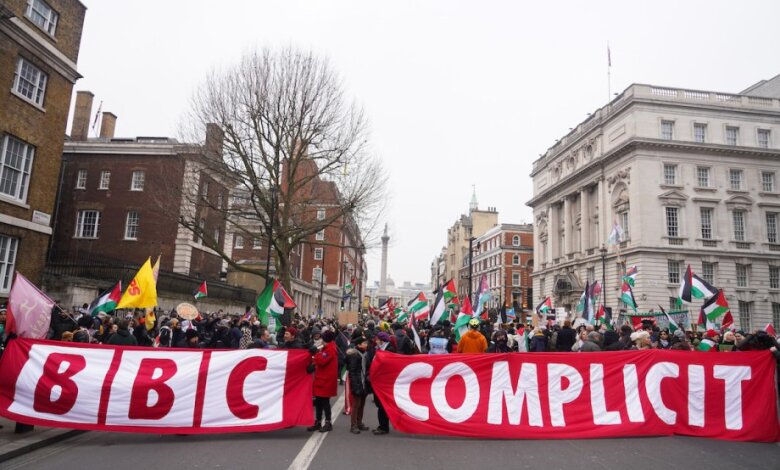BBC at a crossroads: From Trump dispute to Gaza bias allegations

TEHRAN – The recent dispute between US President Donald Trump and the BBC has drawn renewed attention to the broadcaster’s editorial practices, highlighting questions of accountability and internal oversight.
While the clash itself unfolded in the arena of US politics, its real significance lies in the questions it raises about impartiality and governance — issues that have long shadowed the BBC’s coverage of international conflicts, particularly the Israel–Gaza war.
Trump’s standing in the UK
Trump’s state visit to Britain in September provided a striking backdrop. His arrival was met with widespread protests in London and other cities, underscoring his entrenched unpopularity among the public in Britain. Polling conducted during the visit confirmed this sentiment: Ipsos found that more than 60% of Britons disliked Trump, while a YouGov survey indicated only 16% held a favorable view, with the vast majority expressing unfavorable or indifferent opinions.

Anti-Trump protestors march through the streets of London to protest against his state visit to the UK in September 2025. Photo by Hugo Philpott/UPI
Protesters carried placards with harsh slogans such as “Trump Not Welcome,” “No to Racism, No to Trump,” and “Dump Trump.” These banners reflected broader frustrations with his confrontational style, legal controversies, and policy positions on issues such as immigration and climate change. The protests, combined with polling data, reinforced the perception that Trump’s presence in Britain was deeply unwelcome.
This context magnified the BBC’s handling of a Panorama documentary that misleadingly edited Trump’s January 6 speech. The controversy became a flashpoint, ultimately contributing to the resignations of Director General Tim Davie and BBC News Chief Deborah Turness.
Leadership crisis
These high-profile departures underscore the pressures facing publicly funded media organizations in maintaining professional standards under intense scrutiny. Yet, according to a former UK newsroom editor who spoke on condition of anonymity, the resignations do not necessarily reflect a deeper editorial crisis. Speaking to the Tehran Times, the editor also indicated that Trump’s lack of popularity in the UK meant the controversy generated little public sympathy for him, softening the impact of Davie’s decision to step down.
“There have been a few high-profile mistakes which have been rightly amplified, but in the context of enormous output. I do believe the corporation is suffering an identity crisis - what do balanced and impartial mean in a sharply divided political environment? How can mainstream content complement or compete with digital innovators? What is the purpose of the BBC in today’s global environment? The impression is that Davie jumped at an opportunity for which he wouldn’t take much blame—not his fault, and not much love for Trump in the UK.”
On the Panorama documentary itself, the veteran media observer was blunt: “This was a silly mistake by a program maker. It was very foolish, unnecessary. The lack of speedy response from the BBC was also foolish, and reflects the muddled thinking or competing forces internally.”
Yet the Panorama controversy was not an isolated case — it fed into wider concerns about the BBC’s editorial judgment, most visibly in its coverage of the Israel–Gaza conflict.
Bias accusations
In late 2024, more than 100 BBC staff members signed a letter accusing the broadcaster of pro-Israel bias in its reporting. The letter, also endorsed by hundreds of media professionals, argued that the BBC failed to meet its own standards of fairness and accuracy, citing selective sourcing, headline framing, and asymmetrical coverage. Signatories warned that such practices risked dehumanizing Palestinians and eroding public trust.
Critics pointed to headlines that foregrounded Israeli claims while minimizing Palestinian perspectives and civilian impact. Coverage was said to lack full context regarding military operations and casualties, and editorial choices were described as consistently favoring Israeli narratives.

Last year, over 100 BBC staff and 300 media figures accused the broadcaster of ‘censorship’ and ‘anti-Palestinian racism’ in its coverage of Israel’s war on Gaza
The political reporter admitted he had not consumed enough of the coverage to judge definitively, but added: “The BBC is typically accused of bias by both sides, and has been on Gaza. The trouble with trying to offer a balance — even against instincts — is that you can end up angering both sides. Traditionally, the BBC has seen making both sides unhappy as a sign it’s doing something right, but these days that’s more difficult.”
Nonetheless, internal dissent has converged with public demonstrations to challenge the BBC’s credibility. Protests outside BBC offices in London and other cities in the UK accused the broadcaster of “whitewashing” Israeli actions in Gaza and failing to represent Palestinian suffering adequately.
Past controversies
Criticism of the BBC’s Middle East coverage is not new. During the Second Intifada in the early 2000s, advocacy groups accused the broadcaster of disproportionately framing events through Israeli government narratives. In 2014, during the Gaza war, similar complaints resurfaced, with campaigners arguing that BBC reporting gave greater prominence to Israeli military statements than to Palestinian civilian casualties. Each flare-up has reinforced perceptions that the BBC struggles to balance its coverage of the conflict.
Prescott memo
A leaked memo by Michael Prescott, a former adviser to the BBC’s Editorial Guidelines and Standards Committee, alleged that BBC Arabic displayed systemic anti-Israel bias. Yet, while such claims highlight the complexity of impartiality across different BBC services, they have not carried the same weight in public debate as the widespread accusations of pro-Israel bias in the BBC’s English-language coverage.
Editorial pressure
As a license-fee-funded broadcaster, the BBC carries a unique responsibility to its audience. Its mandate is to serve the public, not political figures or foreign governments, and to ensure reporting is transparent, balanced, and reflective of diverse perspectives. The repeated concerns over Gaza coverage suggest that achieving this balance remains an ongoing challenge.
When asked whether political pressure from pro-Israel groups or government officials influences the BBC’s editorial stance, the veteran media observer did not rule out the possibility: “Yes, I think all lobbying has some effect. And the BBC is more sensitive to criticism or lobbying than many media organizations because it cherishes its trusted and balanced reputation so highly.”
The BBC’s future will not be decided by Trump’s complaints or Prescott’s memo, but by how it responds to repeated accusations of pro-Israel bias and the wider challenge of impartiality in conflict reporting. The media insider’s warning of an identity crisis, combined with staff dissent and public protests, shows that the broadcaster is at a crossroads. For a license-fee-funded institution, credibility is everything. Unless the BBC confronts these accusations head-on, it risks losing the very authority that has long defined it as Britain’s most trusted voice.
Leave a Comment